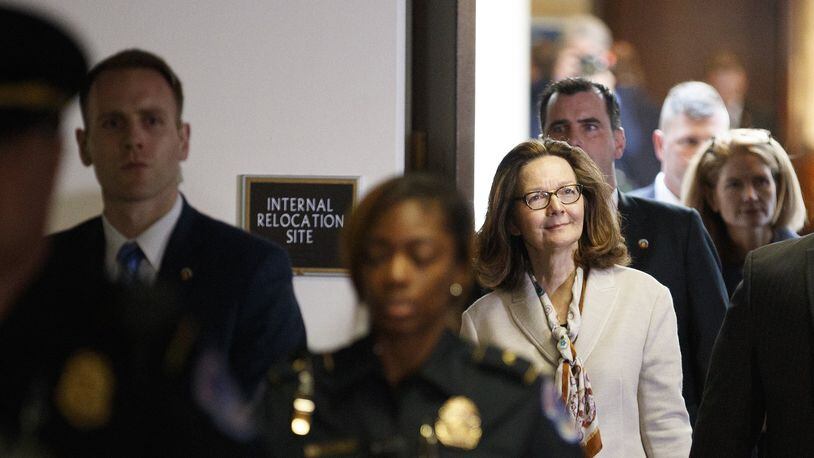Sen. Sherrod Brown, D-Ohio, has voted for just 10 of Trump’s 22 choices to head either cabinet posts or cabinet-level positions, such as U.S. ambassador to the United Nations or White House budget director or administrator of the United States Environmental Protection Agency.
It is yet another sign of how dysfunctional Washington has become. A couple of decades ago, “the average confirmation hearing lasted about 15 minutes, and as long as they didn’t have horns, they confirmed them,” Democratic consultant Peter Fenn joked.
But in today’s polarized environment, most cabinet nominees are subjected to a public grilling that sometimes borders on open hostility.
Last week these divisions between Democrats and Republicans were on vivid display as the Senate Intelligence Committee held a contentious confirmation hearing into the nomination of Gina Haspel as director of the CIA.
As a senior CIA official Haspel briefly supervised a secret CIA prison in 2002 where suspected terrorists underwent intensive interrogation, including water-boarding. Sen. John McCain, R-Ariz., urged the Senate to reject Haspel, while several Democrats on the panel expressed frustration over some of her answers.
At one point, Sen. Martin Heinrich, D-N.M., said, “You’re giving very legalistic answers to very fundamentally moral questions.”
A confirmation vote on Haspel will likely occur this week.
‘Amateur hour’
The tug-of-war over Trump’s nominees seems to be escalating as his presidency is into its second year.
“At the beginning of Trump’s term, many Democrats believed a sitting president deserves to have a cabinet member in place absent real wrongdoing,” said James Manley, a onetime adviser to former Senate Majority Leader Harry Reid, D-Nev.
But Manley said many Democrats “have come to believe that was a mistake and that this president doesn’t deserve the deference given how unqualified or embarrassing many of his nominees are.”
To Republicans, Democrats are simply playing crass politics, eager to show the progressive wing of the party that they are determined to stand up to Trump.
They cite last year’s confirmation of Transportation Secretary Elaine Chao, who is the wife of Senate Majority Leader Mitch McConnell, R-Ky. Five of the six senators who opposed her nomination -—- Gillibrand, Elizabeth Warren of Massachusetts, Cory Booker of New Jersey, Bernie Sanders of Vermont, and Jeff Merkley of Oregon —— are considering running for president in 2020.
“They are just saying no,” said Charlie Black, a Republican consultant in Washington. “He has had a few nominees I would not have picked. But some of them are pretty good.”
RELATED: Democrats decry Trump plan to cut $15B in unused funds
Ted Hollingsworth, a Republican lobbyist in Washington, said “it’s clear the Democrats are deeply opposed to Trump and want to signal their opposition wholesale to their constituencies.”
Some Trump nominees, such as Tom Price, are already gone. Price resigned as Health and Human Services Secretary last September following revelations he had spent nearly $400,000 in taxpayer dollars on chartered flights.
Last month, Trump’s choice to be secretary of the Department of Veterans Affair — Rear Admiral Ronny Jackson — withdrew his name following reports he had been drinking heavily on international trips as well as having no real background for running such a large agency.
“One of the hardest things for me to understand for me is the lack of vetting of these people,” Fenn said. “This really is still amateur hour.”
Confirmation chaos
The brutal confirmation battles make Senate races this November even more critical. If Republicans lose control of the Senate, Trump would face nearly insurmountable obstacles in getting his nominees confirmed, prompting Black to say, “Trump would have to clear the nominees with” Senate Democratic Leader Chuck Schumer of New York.
To Brown, Trump has no one to blame but himself. Brown told reporters Wednesday he was a strong supporter of Robert Lighthizer to become U.S. trade representative. But overall, Brown said, “this cabinet by any measure is probably the worst presidential cabinet we have ever seen.”
Confirmation battles for cabinet officials used to be a rarity. In 1989, Senate Democrats rejected the nomination of former Republican Sen. John Tower of Texas to become secretary of defense, a vote motivated in part because Tower was known as a heavy drinker who had antagonized many of his Democratic colleagues.
In 2013, Sen. Rob Portman, R-Ohio, joined a number of other Republicans in trying to block President Barack Obama’s nomination of Chuck Hagel for secretary of defense. Hagel was narrowly confirmed, 58-41.
But in 2016, McConnell raised the confirmation stakes to a new level when he refused to hold a floor vote for Obama’s nomination of Judge Merrick Garland to the U.S. Supreme Court. Democrats seethed at what they regarded as high-handed and unfair maneuver.
“Nothing will top that,” said Mary Anne Marsh, a Democratic consultant in Boston “I don’t think it’s payback. But turnabout is fair play. If they are going to bock a Supreme Court nominee then you have every right to vote against unqualified cabinet nominees.”
The Senate’s descent into confirmation chaos is raising fears that future presidents will face the same tumultuous battles to confirm their top advisers. Portman, who voted for most of Obama’s cabinet choices, said, “Members need to think about what the consequences are of not being able to confirm people.”
Black said both sides need to show more leadership. “It might take four or five Republicans and four or five Democrats who get together and say this is the way going to operate and they would be the swing votes,” he said.
About the Author
